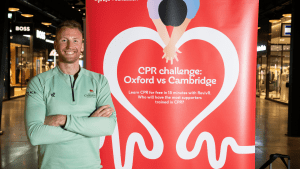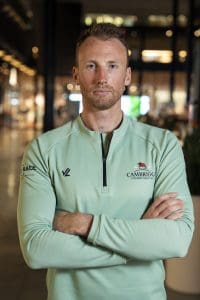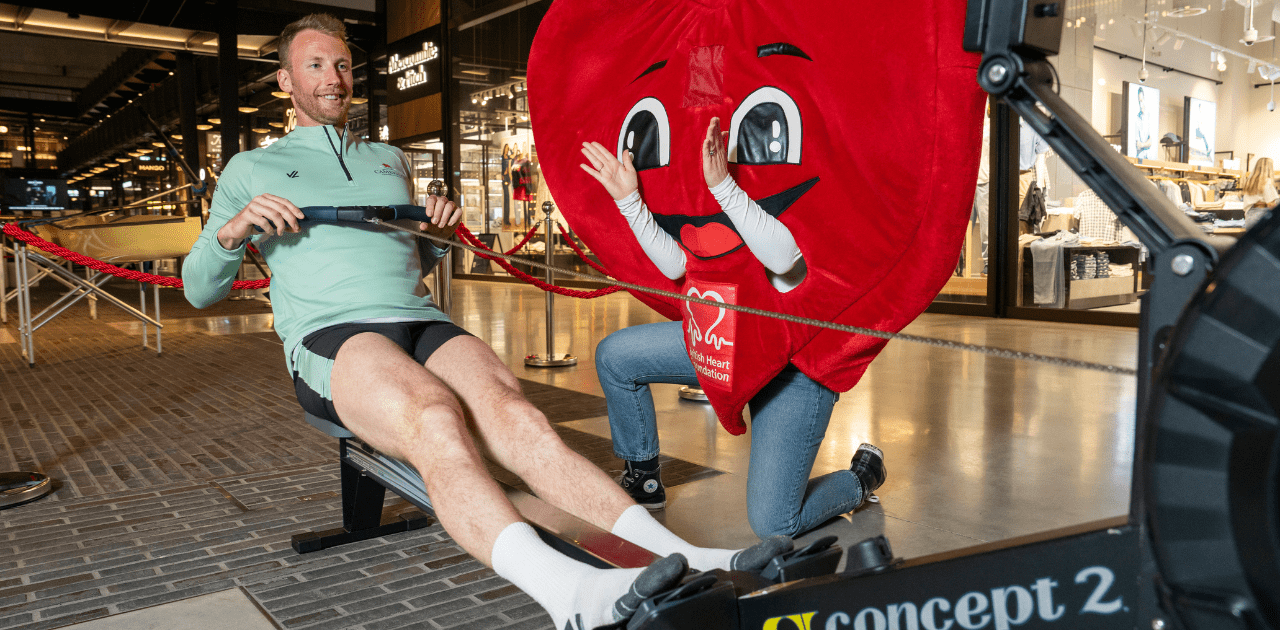Image credits: Photography by Danny Fitzpatrick / DFphotography
Cambridge rower James Robson has made the top Blue Boat crew for this year’s Boat Race on Sunday 13 April – three years after being diagnosed with an abnormal heart rhythm which came to light during a training session.
Competing in the iconic event will be a career highlight for Robson, who is studying for an MBA at Cambridge and a member of the Team GB rowing squad. The thirty-one-year-old made the reserve team at the Paris 2024 Olympics and is tipped to make the LA 2028 Summer Games.
But being diagnosed with the heart rhythm disorder atrial fibrillation (AF) means he has to pay careful attention to his heart rate and take medication when symptoms flare up.
Denmark-born Robson started rowing aged seventeen while boarding at Oundle School in Northamptonshire, before getting into it more seriously while studying geography at Newcastle University. He was training in a pair in 2022 when he first experienced symptoms.
“There was no significant history of heart health problems in my family,” Robson recalled. “I was out rowing and felt something a bit strange. I looked down at my smartwatch and my heart rate was really high for what I was doing at the time – relaxed rowing in a pair at a very easy pace.
at a very easy pace.
“As a trained athlete, I keep a close eye on what my heart rate is doing and what training zone I’m in. I could feel my heart beating in my chest and that the heartbeat was irregular. We were just paddling alongside another crew, keeping time, and my heart rate was
“I told my training partner Will, a good friend of mine, that my heart felt funny, and he was great. He said to stay calm and have a drink and then my heart rate came down. But five strokes in again and it was back sky-high, so we basically stopped and drifted back to the training centre.”
The team medic performed an electrocardiogram (ECG). Robson was then taken to the Royal Berkshire Hospital where the AF diagnosis was confirmed.
One of the most common forms of arrythmia, 1.6 million people in the UK are living with diagnosed AF and it’s believed tens of thousands more could have it without realising. People with the condition are five times more likely to have a stroke – although this risk is reduced if AF is well monitored and treated.
BHF-funded study looking at how smartwatches could help streamline AF screening
The Boat Race Company (BRCL) and British Heart Foundation are partnering for a second year for The Boat Race 2025. The biggest independent funder of heart and circulatory research in the UK, the BHF funds over £100 million of research each year in a bid to develop future treatments, cures and breakthroughs.
This includes a clinical study led by Dr Peter Charlton, a BHF Research Fellow at Cambridge University, looking at whether wearable devices such as smartwatches and fitness bands could be reliably used to help improve the screening process for diagnosing AF.
Confirming an AF diagnosis requires the irregular heartbeat to be captured. Therefore, screening often involves people taking home a handheld clinical device and checking their heart rhythm twice daily for two weeks. Dr Charlton’s research aims to develop a reliable way to detect AF from everyday wearable devices, as well as developing a 30-second test to identify people who are unlikely to have AF – eliminating the need for expensive home monitoring using a clinical device.
The research involves analysing large volumes of data from AF screening trials. New data will also be collected from 100 participants of an ongoing trial, who will wear wearable devices alongside a clinical heart monitor for one week.
Dr Charlton said: “Many people use consumer devices such as smartwatches with heart-monitoring technology. These devices could potentially be used to help improve how we screen for AF, making it quicker and cheaper to diagnose the condition, and ultimately lead to a reduction in AF-related strokes.
“Fantastic opportunity” to support BHF
Robson’s AF diagnosis means the charity’s work is now very close to his own heart.
Robson added: “To have the opportunity to work with British Heart Foundation through their partnership with The Boat Race means a lot to me. Millions of people watch The Boat Race, so it’s a fantastic opportunity to try to raise funds and awareness for.
“I’ll also never forget Christian Eriksen having a cardiac arrest on the pitch at Parken Stadium in Copenhagen [during Euro 2020] – where I used to watch my local team (F.C. Copenhagen) play football. If sport, any sport, can be used to shed light on the work of BHF, that’s great, and I want to do whatever I can to help.”
Eriksen survived thanks to the quick response of team doctors. But there are more than 30,000 out-of-hospital cardiac arrests (OHCAs) in the UK each year – and the overall survival rate is less than one in ten, as death occurs within minutes without immediate treatment.
Early CPR and defibrillation can more than double the chances of survival. With the BHF’s RevivR tool, anyone can learn CPR for free in 15 minutes.
Robson is now under the care of sports cardiology expert Professor Sanjay Sharma and Sir Steve Redgrave’s wife Ann, chief medical officer for GB rowing.

Photography by Danny Fitzpatrick / DFphotography
Robson said: “I was prescribed a drug called Flecainide, which I always have to hand wherever I go but only need to take if I feel something strange with my heart. It slows the nerve impulses in the heart and reduces the heart rate to a normal level.
“For the first 18 months after diagnosis, I had episodes of AF around once every three months. Professor Sharma did an ECG stress test and echo scan and from that we had a conversation about lifestyle changes I could make. I’ve reduced my caffeine intake, and I do a bit of meditation. Since introducing these, the episodes have reduced.
“I find when they happen, it’s often following a race when I’m resting. … If the episodes started getting worse/more frequent, they have discussed with me I’d probably need ablation treatment. I currently have regular ECG tests.
“If I do have an episode, I obviously stop training. I take my meds straight away and they have an almost immediate positive impact. I then try to rest, take a day off from training, and build myself back up.”
Of his love of rowing, Robson said: “I love the camaraderie and the team element of rowing. It’s like tying two or three world-class sprinters together – that’s the level of synchronicity you have to work at, with everyone working to their physical limit. When you get it right, it almost feels like flying.
“When you’re on the national team, you train up to three sessions a day. Here at Cambridge, I leave home at 5.45am and get the train to Ely where we train for 90 minutes, then travel back for 9am lectures. I’m in classes from 9-5pm and then we train in the evening. It’s a full-time schedule.”
With Boat Race excitement growing, he added: “I’ve grown up watching it. If I’m honest, I probably underestimated it until I got to Cambridge. It’s incredibly special having these athletes competing, juggling so much. You have Olympians training alongside 18-year-olds and we’re all part of something much bigger than ourselves.
“It’s the biggest event in rowing on the biggest stage. The race audience is around 200,000 and hopefully 50% will be cheering for us. It’s a very different challenge to the Olympics – they call it a three-minute sprint with a 15-minute race tacked on the end. The actor Hugh Laurie [who rowed for Cambridge] described it as a ‘race until the other side realises they can’t win’. It’s Gladiatorial, is what he means.”
About AF
BHF Senior Cardiac Nurse, Emily McGrath said: “The risk of developing AF generally gets higher as we age, however as James’ story demonstrates, it can affect younger people too. Known risk factors include high blood pressure, coronary heart disease, obesity, diabetes, cardiomyopathy and stress. It can also be linked with other conditions, such as asthma and lung diseases, although there isn’t always an obvious cause.
“With AF, the electrical signals in the heart’s top chambers (atria) do not get sent out properly and instead of being steady and regular, they quiver or twitch, causing your heart to beat randomly, which means blood isn’t pumped as well as it should be.
“Episodes of AF can last anything from seconds to minutes and sometimes even longer, with other symptoms including chest pain or tightness, breathlessness, dizziness or feeling faint, and unusual tiredness. These symptoms don’t always mean you have AF but it’s very important to see a healthcare professional if you experience them or notice your pulse seems unusually fast or irregular, especially as AF is a major cause of stroke. This risk can be significantly reduced if AF is treated, usually with medication, and some people may need an ablation procedure or to have a pacemaker fitted.”
To take on your own rowing challenge and help raise money for BHF, visit bhf.org.uk/rowingchallenge
For more information about AF click here
To learn CPR for free in 15 minutes, see bhf.org.uk/revivr
About the British Heart Foundation
It is only with donations from the public that the BHF can keep its life saving research going. Help us turn science fiction into reality. With donations from the public, the BHF funds ground-breaking research that will get us closer than ever to a world free from the fear of heart and circulatory diseases. A world where broken hearts are mended, where millions more people survive a heart attack, where the number of people dying from or disabled by a stroke is slashed in half. A world where people affected by heart and circulatory diseases get the support they need. And a world of cures and treatments we can’t even imagine today. Find out more at bhf.org



